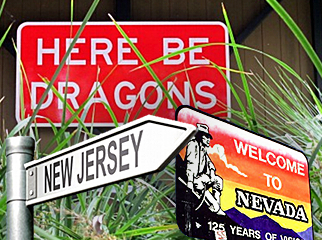 Estimates vary as to exactly when New Jersey will have its online gambling market processing wagers. Officially, the legislation says the starting gun has to go off within 270 days of the bill’s passage, putting the deadline in mid-November. Last week, Caesars Entertainment’s Gary Loveman estimated it would take at least twice that long, perhaps two years. State Senator Ray Lesniak believes the system should be active by September. Attorney and Gambling And The Law author I. Nelson Rose told the Star-Ledger he didn’t see “any reason it wouldn’t be up and operating by the end of this year.”
Estimates vary as to exactly when New Jersey will have its online gambling market processing wagers. Officially, the legislation says the starting gun has to go off within 270 days of the bill’s passage, putting the deadline in mid-November. Last week, Caesars Entertainment’s Gary Loveman estimated it would take at least twice that long, perhaps two years. State Senator Ray Lesniak believes the system should be active by September. Attorney and Gambling And The Law author I. Nelson Rose told the Star-Ledger he didn’t see “any reason it wouldn’t be up and operating by the end of this year.”
Nothing can be done until the New Jersey Division of Gaming Enforcement (DGE) finishes dotting the i’s on the state’s online gambling regulations, but the DGE hopes to finish the first draft by Thursday. Once that cat’s in the bag, the regs can be published in the New Jersey Register, after which a two-month comment clock starts ticking.
That clock could go on ticking longer than planned if the state’s horseracing interests – still smarting from the legislation designating Atlantic City casinos as the sole purveyors of online action — mounted a legal challenge to the bill. Deutsche Bank analyst Richard Carter suggested such a challenge could delay implementation of New Jersey’s online plans by “at least a year.”
NEVADA CONSIDERS ITS OPTIONS
Similar protests have been voiced in Nevada, where smaller companies not fortunate enough to already possess an unrestricted gaming license have labeled the state’s legislation as protectionist. Geoffrey Lawrence, deputy policy director at the free-market friendly Nevada Policy Research Institute, told the Las Vegas Sun that the benefits the legislation provides Nevada’s big casino companies reminded him of a scenario in which “government restrictions prohibited the entrepreneurs who founded eBay from doing so unless they first constructed physical department stores.”
At present, Nevada is like the Henry Ford of online gambling. You can have any type of gambling you want, so long as it’s poker. But expanding that to a wider variety of gaming options would seem more a matter of when, not if. After all, the hard part – getting legislators to approve “interactive gaming” – is done; the choice of what types of gaming to offer is at the discretion of the regulator.
Nevada’s poker-only plan is primarily a hangover from the days when the state still believed Senate majority leader Harry Reid (D-NV) could sell poker’s unique skill game status to skeptical members of Congress. While there’s talk of Rep. Joe Barton (R-TX) taking the defibrillator paddles to his dormant federal online poker bill, the states are in the driver’s seat. The call for expanded gaming options will come from the public or the operators or both, but it will come, especially if New Jersey’s market takes off and other states decide they want to get with a winner.
Gaming Control Board chairman A.G. Burnett said the poker-only decision was made “to be cautionary, to make sure we did things right before we allowed all other type of games.” University of Nevada, Reno economist Mark Nichols acknowledges that Nevada’s limited offering “certainly doesn’t make us competitive” with New Jersey, but he recognizes that “a state may want to wade into this more slowly.”
SLOW AHEAD
Although both state governments pitched online gambling’s ability to provide badly needed tax revenue, there’s ample reason to proceed with caution. Two brand new online gambling jurisdictions are launching in a country that only recently decided online gambling did not cause cancer. These debuts will be closely scrutinized and the slightest missteps – failure to properly exclude out-of-state players, letting a minor open an account, uncovering chip-dumping by an Al Qaeda sleeper cell, etc. – will unleash op-eds of fury.
If something like the day-one fiasco of the British Columbia Lottery Corp’s online gambling site PlayNow.com were to be repeated in New Jersey or Nevada, it would make headlines around the world. As would the subsequent revelations that the government knew their product was flawed but decided sticking to their schedule was more important.
Fortunately, unlike Canada’s online gambling jurisdictions, these state governments won’t be taking wagers themselves, so most of the blame for any glitch can be contained to the operator. But the pols who passed the legislation and the regulatory appointees tasked with monitoring the business will feel the heat all the same. Other states considering taking the online gambling plunge might also consider the ‘number of days without a tornado’ tally when choosing a jurisdiction as its regulatory hub. So, yes… online gambling promises to put a lot of extra coin into state coffers, but here be dragons, as well. Proceed accordingly.
